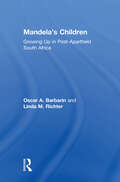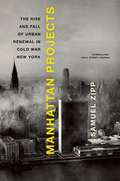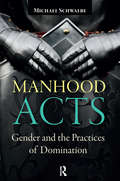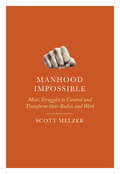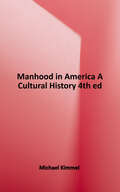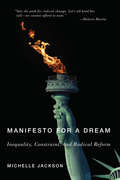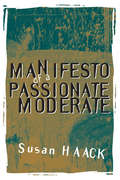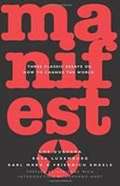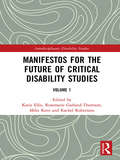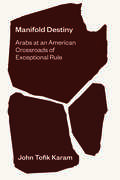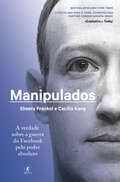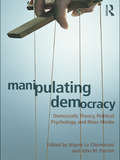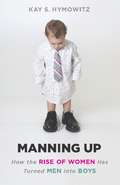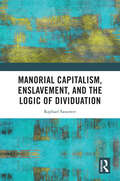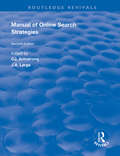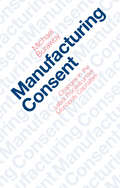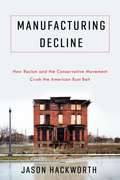- Table View
- List View
Managing: What Managers Do - And Can Do Better (16pt Large Print Edition)
by Henry MintzbergA half century ago Peter Drucker put management on the map. Leadership has since pushed it off. Henry Mintzberg aims to restore management to its proper place: front and center. &“We should be seeing managers as leaders.&” Mintzberg writes, &“and leadership as management practiced well.&” This landmark book draws on Mintzberg's observations of twenty-nine managers, in business, government, health care, and the social sector, working in settings ranging from a refugee camp to a symphony orchestra. What he saw—the pressures, the action, the nuances, the blending—compelled him to describe managing as a practice, not a science or a profession, learned primarily through experience and rooted in context.But context cannot be seen in the usual way. Factors such as national culture and level in hierarchy, even personal style, turn out to have less influence than we have traditionally thought. Mintzberg looks at how to deal with some of the inescapable conundrums of managing, such as, How can you get in deep when there is so much pressure to get things done? How can you manage it when you can't reliably measure it? This book is vintage Mintzberg: iconoclastic, irreverent, carefully researched, myth-breaking. Managing may be the most revealing book yet written about what managers do, how they do it, and how they can do it better.
Manavi Bhugol (Parichay va Pratyakshike) Second Semester FYBA New NEP Syllabus - SPPU: मानवी भूगोल (परिचय व प्रात्यक्षिके) दुसरे सत्र एफ.वाय.बी.ए. नवीन एन.इ.पी. अभ्यासक्रम - सावित्रीबाई फुले पुणे यूनिवर्सिटी
by Dr Jyotiram Chandrakant More Dr Sanjay Dagu Pagar Prof. Ashok Maruti Thorat Dr Dilip Dnyaneshwar Mulukमानवी भूगोल हा भूगोलाच्या महत्त्वाच्या शाखांपैकी एक असून, तो मानव आणि पर्यावरण यांच्यातील परस्परसंबंधांचा अभ्यास करतो. या विषयामध्ये लोकसंख्या, वसाहती, कृषी, आर्थिक क्रिया, सामाजिक आणि सांस्कृतिक घटकांचा समावेश होतो. मानवी भूगोलाच्या शाखांमध्ये आर्थिक भूगोल, सामाजिक भूगोल, कृषी भूगोल, औद्योगिक भूगोल, नागरी भूगोल, राजकीय भूगोल आणि पर्यटन भूगोल यांचा समावेश आहे. या विषयाचा विकास 18व्या शतकात सुरू झाला आणि पुढील काळात तो अधिक व्यापक होत गेला. मानवी भूगोलामध्ये लोकसंख्येचे वितरण, स्थलांतर, शहरीकरण, उद्योगधंदे, व्यापार, वाहतूक आणि विपणन यांचे सखोल विश्लेषण केले जाते. या अभ्यासामुळे मानवी जीवनावर भौगोलिक घटकांचा प्रभाव समजण्यास मदत होते. आधुनिक तंत्रज्ञान, उपग्रह प्रतिमा आणि भौगोलिक माहिती प्रणालीच्या मदतीने मानवी भूगोलाचा अभ्यास अधिक प्रभावीपणे केला जातो. त्यामुळे मानवी भूगोल हा वेगाने विकसित होणारा विषय असून, नियोजन व संसाधन व्यवस्थापनासाठी तो अत्यंत महत्त्वाचा आहे.
Manavi Vikasache Arthashastra Second Semester FYBA New NEP Syllabus - RTMNU: मानवी विकासाचे अर्थशास्त्र दुसरे सत्र एफ.वाय.बी.ए. नवीन एन.इ.पी. अभ्यासक्रम - राष्ट्रसंत तुकडोजी महाराज नागपूर विद्यापीठ
by Prof. Dr. Rakshit Madan Bagde‘मानवी विकासाचे अर्थशास्त्र’ या पुस्तकात मानवी विकासाच्या विविध पैलूंचे विश्लेषण केले आहे. यात मानवी विकास म्हणजे काय, त्याचे अर्थ, व्याख्या, महत्त्व आणि उद्दिष्ट्ये काय आहेत, याबद्दल चर्चा केली आहे. या पुस्तकात मानवी विकासाकडे बघण्याचे विविध दृष्टिकोन स्पष्ट केले आहेत, जसे की मूलभूत गरजा दृष्टिकोन, गुणवत्ता जीवन दृष्टिकोन आणि क्षमता दृष्टिकोन. मानवी सुरक्षा, शाश्वत विकास उद्दिष्ट्ये आणि मानवी विकासासाठी दृष्टीकोन यावरही चर्चा करण्यात आली आहे. यात आर्थिक सुरक्षा, अन्न सुरक्षा, आरोग्य सुरक्षा, पर्यावरण सुरक्षा, व्यक्तिगत सुरक्षा, समुदाय सुरक्षा आणि राजकीय सुरक्षा यांचा समावेश आहे. पुस्तकात मानवी विकासाचे परिमाण आणि त्याचे मोजमाप कसे करायचे, याची माहिती दिली आहे. यात सशक्तीकरण, सहकार्य, समता, शाश्वतता, सहभाग आणि उत्पादकता यांसारख्या घटकांचे विश्लेषण आहे. तसेच, मानवी विकास निर्देशांक (HDI) आणि इतर निर्देशांकांच्या साहाय्याने मानवी विकासाचे मूल्यांकन कसे करायचे, हे स्पष्ट केले आहे. याव्यतिरिक्त, जागतिकीकरण, व्यापार आणि तंत्रज्ञान यांचा मानवी विकासावर काय परिणाम होतो, याचीही माहिती पुस्तकात दिली आहे.
Mandela's Children: Growing Up in Post-Apartheid South Africa
by Oscar A. Barbarin Linda M. RichterFirst Published in 2001. Routledge is an imprint of Taylor & Francis, an informa company.
Manhattan Projects: The Rise and Fall of Urban Renewal in Cold War New York
by Samuel ZippFocusing on four iconic "Manhattan projects"--the United Nations building, Stuyvesant Town, Lincoln Center, and the great swaths of public housing in East Harlem--Zipp unearths a host of forgotten stories and characters that flesh out the conventional history of urban renewal.
Manhattan, '45
by Jan MorrisOn June 25, 1945, 14,000 American service men and women sailed into New York aboard the British liner Queen Mary. They were the first big contingent to return from the victory over Nazi Germany, and the city that awaited them stood at a historical climax of power, confidence, hope, and prestige, still curiously laced with a provincial innocence. In this new book by one of the most gifted stylists in the English language, we disembark at Manhattan with the returning GIs, and discover for ourselves how the city was. We ride the vanished trolleys, the El, the Hudson River ferry-boats. We meet characters as disparate as developer Robert Moses, Sherman Billingsley of the Stork Club, painter Jackson Pollock, and Joe Gould, a Greenwich Village denizen who claimed to speak the seagull language. We explore Harlem and the Lower East Side, we inspect the menu at the legendary Le Pavillon, we board the Twentieth Century Limited, and we swoon to Sinatra at Radio City Music Hall. Few aspects of Manhattan are neglected in Jan Morris's affectionate evocation--slum and Social Register are both here, City College and Times Square, the genius of the New York School and the panache of the New York Fire Department. Manhattan '45 gets its title, so the author tells us in her epilogue, because it sounds "partly like a kind of gun, and partly like champagne," and in these pages the victorious, celebratory, and explosive Manhattan of four decades ago finds a permanent souvenir.
Manhood Acts: Gender and the Practices of Domination
by Michael SchwalbeIn Manhood Acts Michael Schwalbe offers a new perspective on the social construction of manhood and its relationship to male domination. Schwalbe argues that study of masculinity has lost touch with its feminist roots and has been seduced by the politically safe notion of 'multiple masculinities'. Manhood Acts delineates the practices males use to construct 'women' and 'men' as unequal categories. Schwalbe reclaims the radical feminist insights that gender is a field of domination, not a field of play, and that manhood is fundamentally about exerting or resisting control. Manhood Acts arrives at the conclusion that abolishing gender as a system of oppression will require more than transgressive self-presentation. It will be necessary to end the exploitive economic relationships that necessitate manhood itself.
Manhood Impossible: Men's Struggles to Control and Transform their Bodies and Work
by Scott MelzerIn Manhood Impossible, Scott Melzer argues that boys’ and men’s bodies and breadwinner status are the two primary sites for their expression of control. Controlling selves and others, and resisting being dominated and controlled is most connected to men’s bodies and work. However, no man can live up to these culturally ascendant ideals of manhood. The strategies men use to manage unmet expectations often prove toxic, not only for men themselves, but also for other men, women, and society. Melzer strategically explores the lives of four groups of adult men struggling with contemporary body and breadwinner ideals. These case studies uncover men’s struggles to achieve and maintain manhood, and redefine what it means to be a man.
Manhood in America: A Cultural History, Fourth Edition
by Michael KimmelFor more than three decades, the women's movement and its scholars have exhaustively studied women's complex history, roles, and struggles. In Manhood in America: A Cultural History, Fourth Edition, author Michael Kimmel argues that it is time for men to rediscover their evolution. Drawing on a myriad of sources, he demonstrates that American men have been eternally frustrated by their efforts to keep up with constantly changing standards. Kimmel contends that men must follow the lead of the women's movement; it is only by mining their past for its best qualities and worst excesses that men will free themselves from the constraints of the masculine ideal.
Manhunt, Night Stalker: How I Brought Serial Predator Delroy Grant to Justice (Manhunt #2)
by Colin SuttonWhat does it take to catch a predator who has terrorised south-east England for over fifteen years? Delroy Grant—dubbed the Night Stalker—was one of London's most feared and shocking sex predators. During his reign of terror, he established a clear MO. Visit a target at night. Remove a window pane and slide in. Unscrew the lightbulbs. Cut the power. Rip out the telephone wires. Tiptoe to the bedroom. Wake the victim by shining a torch in their eyes. What followed was often unspeakable. When SIO Colin Sutton was drafted into the case, Grant had been at large for seventeen years. Stepping up where others had failed, he began the determined, relentless police work that had marked the end for infamous serial killer Levi Bellfield. Case by case, clue by clue. Night Stalker is the chilling true story of one of the most testing manhunts the Metropolitan Police have ever undertaken. It is a glimpse into the heart of darkness—and into the mind and work of the brilliant detective who brought one of London's most feared monsters to justice.
Manifesto for a Dream: Inequality, Constraint, and Radical Reform (Inequalities)
by Michelle JacksonA searing critique of our contemporary policy agenda, and a call to implement radical change. Although it is well known that the United States has an inequality problem, the social science community has failed to mobilize in response. Social scientists have instead adopted a strikingly insipid approach to policy reform, an ostensibly science-based approach that offers incremental, narrow-gauge, and evidence-informed "interventions." This approach assumes that the best that we can do is to contain the problem. It is largely taken for granted that we will never solve it. In Manifesto for a Dream, Michelle Jackson asserts that we will never make strides toward equality if we do not start to think radically. It is the structure of social institutions that generates and maintains social inequality, and it is only by attacking that structure that progress can be made. Jackson makes a scientific case for large-scale institutional reform, drawing on examples from other countries to demonstrate that reforms that have been unthinkable in the United States are considered to be quite unproblematic in other contexts. She persuasively argues that an emboldened social science has an obligation to develop and test the radical policies that would be necessary for equality to be assured for all.
Manifesto of a Passionate Moderate: Unfashionable Essays
by Susan HaackForthright and wryly humorous, philosopher Susan Haack deploys her penetrating analytic skills on some of the most highly charged cultural and social debates of recent years. Relativism, multiculturalism, feminism, affirmative action, pragmatisms old and new, science, literature, the future of the academy and of philosophy itself—all come under her keen scrutiny in Manifesto of a Passionate Moderate. "The virtue of Haack's book, and I mean virtue in the ethical sense, is that it embodies the attitude that it exalts. . . Haack's voice is urbane, sensible, passionate—the voice of philosophy that matters. How good to hear it again."—Jonathan Rauch, Reason "A tough mind, confident of its power, making an art of logic . . . a cool mastery."—Paul R. Gross, Wilson Quarterly "Few people are better able to defend the notion of truth, and in strong, clear prose, than Susan Haack . . . a philosopher of great distinction."—Hugh Lloyd-Jones, National Review "If you relish acute observation and straight talk, this is a book to read."—Key Reporter (Phi Beta Kappa) "Everywhere in this book there is the refreshing breeze of common sense, patiently but inexorably blowing."—Roger Kimball, Times Literary Supplement "A refreshing alternative to the extremism that characterizes so much rhetoric today."—Kirkus Reviews
Manifesto: Three Classic Essays on How to Change the World
by Friedrich Engels Karl Marx Ernesto Che Guevara Rosa Luxemburg"Let's be realists, let's dream the impossible." Che Guevara's words summarize the radical vision of the four famous rebels presented in this book: Marx and Engels' "Communist Manifesto," Rosa Luxemburg's "Reform or Revolution" and Che Guevara's "Socialism and Humanity." Far from being lifeless historical documents, these manifestos for revolution will resonate with a new generation also seeking a better world. "The world described by Marx and Engels... is recognizably the world we live in 150 years later.
Manifestos for the Future of Critical Disability Studies: Volume 1 (Interdisciplinary Disability Studies)
by Rosemarie Garland-Thomson Rachel Robertson Katie Ellis Mike KentThis collection identifies the key tensions and conflicts being debated within the field of critical disability studies and provides both an outline of the field in its current form and offers manifestos for its future direction. Traversing a number of disciplines from science and technology studies to maternal studies, the collection offers a transdisciplinary vision for the future of critical disability studies. Some common thematic concerns emerge across the book such as digital futures, the usefulness of anger, creativity, family as disability allies, intersectionality, ethics, eugenics, accessibility and interdisciplinarity. However, the contributors who write as either disabled people or allies do not proceed from a singular approach to disability, often reflecting different or even opposing positions on these issues. Containing contributions from established and new voices in disability studies outlining their own manifesto for the future of the field, this book will be of interest to all scholars and students working within the fields of disability studies, cultural studies, sociology, law, history and education. The concerns introduced here are further explored in its sister volume Interdisciplinary approaches to disability: looking towards the future.
Manifold Destiny: Arabs at an American Crossroads of Exceptional Rule
by John Tofik KaramAt the border where Brazil, Paraguay, and Argentina meet under the scrutiny of the US and Mercosur (the large South American trade bloc), Arabs have long fulfilled what author John Tofik Karam calls a "manifold destiny." Karam casts Lebanese, Palestinians, and Syrians at this American border as circumstantial protagonists of a hemispheric saga. For the more than six decades since they started settling at the trinational border between Brazil, Paraguay, and Argentina, Arabs have animated the hemisphere. Their transnational economic and social projects reveal a heretofore unacknowledged venue of exceptional rule in which the community accommodates and abides multiple states' varied suspensions of norms and laws. Arabs set up businesses and community centers at the border under authoritarian military governments between the 1950s and 1980s; thereafter, when denied full democratic enfranchisement, they instead underwent increasing surveillance from the 1990s to today. Karam reveals an unfinished history of exceptional rule that Arabs accommodate from an authoritarian past to a counterterrorist present. Karam's riveting account draws on anthropological and historical research from each side of this trinational South American border, as well as from the US—where government bureaucrats still suspect Arabs at the border of would-be-terrorist subversion. Offering a fresh understanding of the hemisphere, Manifold Destiny brings the transnational turn of Middle Eastern studies to bear upon the fields of American studies, Brazilian studies, and Latin American studies.
Manipulados: A verdade sobre a batalha do Facebook pelo poder absoluto
by Sheera Frenkel Cecilia KangO livro que o Facebook não quer que leia. Sheera Frenkel e Cecilia Kang, premiadas jornalistas do New York Times, oferecem-nos um relato impressionante da queda em desgraça do gigante de Sillicon Valley. A verdade é muito mais complexa do que aparenta. Este livro é prova disso. BESTSELLER DO NEW YORK TIMES LIVRO DO ANO PARA A TIMES, COSMOPOLITAN, FORTUNE, FOREIGN AFFAIRS, WIRED «Explosivo.» Today Desde o escândalo que envolveu a Cambridge Analytica e a campanha de desinformação russa, que o Facebook tenta desviar atenções e esquivar-se a uma avalanche de controvérsias e inquéritos sobre a sua estratégia empresarial. Este gigante tecnológico, que se arroga a criação de um mundo hiperconectado onde todos usufruem de igual direito a expressar-se livremente, é, na verdade, uma voraz máquina de recolha de dados. Ao mesmo tempo, serve, sem escrúpulos, de plataforma a uma epidemia de desinformação tóxica e danosa cujas consequências estão à vista de todos. Muitos consideram que, nos últimos anos, o Facebook perdeu o rumo, que se desviou do seu intento original, o de aproximar pessoas. No entanto, esta minuciosa investigação das premiadas Sheera Frenkel e Cecilia Kang demonstra precisamente o contrário: os passos em falso dos últimos anos não são uma anomalia, antes consequências inevitáveis da arquitetura de um modelo de negócio impiedoso onde imperam as lutas de poder, enorme secretismo e operações ocultas. Sob a liderança de ferro do génio tecnológico de Mark Zuckerberg e do arquétipo da mulher-de-negócios-inspiradora Sheryl Sandberg, o crescimento ilimitado e o lucro desmedido têm sido as únicas constantes na evolução deste colosso. Esta não é a história de um cientista que perdeu o controlo sobre a sua criação. É a história real de duas pessoas que deliberadamente entregaram o seu império para servir de palco a criminosos e regimes políticos corruptos, com consequências devastadoras para todo o mundo. «Ler Manipulados dá-nos a mesma satisfação que contratar um detetive privado para investigar o cônjuge adúltero: confirma as nossas piores suspeitas.» New York Times Book Review «Fascinante. Os pormenores que dá a conhecer serão importantes no balanço em curso sobre o impacto das redes sociais na sociedade e na democracia.» Washington Post «Tanta informação nova neste livro sobre uma história que julgávamos compreender na totalidade. Afinal, parece que sabíamos muito pouco» Morning Joe «Fascinante.» People «Um registo precioso de tudo aquilo que correu mal, quando, onde e porquê, em especial nos últimos cinco anos.» CNN «Explosivo. Regista denúncias importantes sobre a vasta influência e erros reincidentes da empresa.» Today «Frenkel e Kang argumentam de forma inequívoca a necessidade de agirmos no sentido de eliminar de imediato do Facebook as mentiras, o ódio e a desinformação, se queremos preservar a democracia.» Associated Press «A verdade nua e crua, horrível, e feia, Manipulados, sobre o Facebook e Mark Zuckerberg, das jornalistas do New York Times, Sheera Frenkel e Cecilia Kank, é de arrepiar.» Luís Delgado, Visão «Não têm o Facebook instalado para proteger fontes e escreveram o bestseller que revela como Zuckerberg tomou decisões polémicas. Sheera Frenkel e Cecilia Kang querem que se saiba a "feia verdade".» Manuel Pestana Machado, Observador
Manipulating Democracy: Democratic Theory, Political Psychology, and Mass Media
by Wayne Le CheminantManipulation is a source of pervasive anxiety in contemporary American politics. Observers charge that manipulative practices in political advertising, media coverage, and public discourse have helped to produce an increasingly polarized political arena, an uninformed and apathetic electorate, election campaigns that exploit public fears and prejudices, a media that titillates rather than educates, and a policy process that too often focuses on the symbolic rather than substantive. Manipulating Democracy offers the first comprehensive dialogue between empirical political scientists and normative theorists on the definition and contemporary practice of democratic manipulation. This impressive array of distinguished scholars—political scientists, philosophers, cognitive psychologists, and communications scholars—collectively draw out the connections between competing definitions of manipulation, the psychology of manipulation, and the political institutions and practices through which manipulation is seen to produce a tightly-knit exploration of an issue at the heart of democratic politics.
Manipulation als System: Über die bekannten und verborgenen Seiten systematischer Beeinflussungen (essentials)
by Heribert WienkampManipulationen sind etwas ganz Normales und sie begegnen uns jeden Tag auf Schritt und Tritt. Als strategisches Verhalten von Lebewesen zur Territorialverteidigung oder zur Klärung von Machtverhältnissen kommen sie überall vor. Nur Menschen ist es vergönnt, durch Einsatz ihrer geistigen Fähigkeiten sich dabei geschickt zum eigenen Vorteil zu verhalten und ihre Mitmenschen in ihrem Sinne zu beeinflussen. Welche z.T. versteckten Mechanismen hinter Beeinflussungsversuchen stehen und mit welchen Verhaltensmanövern Sie zu rechnen haben, erfahren Sie in diesem Buch. Zum einen werden die verschiedenen Facetten der Manipulation aufgedeckt, zum anderen die unterschiedlichsten Spielarten von Suggestionen bzw. Beeinflussungen versuchsweise in einem integrierten Modell zusammengefasst und es wird auf ihre Möglichkeiten für psychodiagnostische Zwecke hingewiesen.
Manipulative Monkeys: The Capuchins of Lomas Barbudal
by Susan PerryThe authors describe is behavior as entertaining--and occasionally as alarming--as it is recognizable: the competition and cooperation, the jockeying for position and status, the peaceful years under an alpha male devolving into bloody chaos, and the complex traditions passed from one generation to the next. <P><P>Interspersed with their observations of the monkeys' lives are the authors' colorful tales of the challenges of tropical fieldwork--a mixture so rich that by the book's end we know what it is to be a wild capuchin monkey or a field primatologist.
Manithavala Membadu
by PazhaniveluRespected professor Mr. K Ponnu swami shares the different components of schooling and educational system in Tamil Nadu. He also shares the experience of his own childhood period and the peoples whom he met and about their friendship with him in order to understand the importance of human resource even from childhood.
Manning Up
by Kay S. HymowitzHymowitz, author of Marriage and Caste in America: Separate and Unequal Families in a Post-Marital Age, examines the radical changes in male courting habits over the last 50 years. He asserts that in an economic and social landscape where the traditional male role has been made unnecessary and even, in many ways, undesirable, a new stage of male development has emerged. These man-children live out their 20's and 30's with fierce anti-domestic tendencies, thus presenting courtship difficulties for their female peers. Hymowitz attempts here to explain this change and what it means for the future of family life and society as a whole. This book will appeal to those with an interest in sociology and modern culture. Annotation ©2011 Book News, Inc. , Portland, OR (booknews. com)
Manorial Capitalism, Enslavement, and the Logic of Dividuation
by Raphael SassowerManorial Capitalism, Enslavement, and the Logic of Dividuation proffers three perspectives on the plantation slave economy of the Antebellum South. The first explores the paternal function as exemplified in the structural authority of the lord of the manor both symbolically and operationally. This figure of masculine authority persisted from the Medieval period to orchestrate what is called here Manorial Capitalism. The second examines the exploitation and alienation that epitomize the logic of capitalism from the plantation economy to the present. And the third deploys retroactively the logic of dividuation to the plantation, a logic that draws its inspiration from neoliberal financial capitalism as well as from anthropological accounts (which distinguish the dividual from the Cartesian-Kantian individual). This book argues that reducing individuals to dividuated components continues to enable a dehumanizing capitalist mindset to fixate on abstracted labor power rather than seeing laboring individuals.
Manual of Online Search Strategies: Volumes I-iii (Routledge Revivals)
by C. J. Armstrong J. A. LargePublished in 1992, like the first, this second edition is not intended as introductory textbook command-driven, Boolean searching. It is targeted at online searchers who already have some knowledge of command languages and may be proficient searchers on databases in one or two subject areas, but when required to venture into new and less familiar territory still need guidance. It is also offered to end users who possess the subject expertise but lack of information retrieval know-how. The Manual is offered as a guide to database selection and a navigational aid through the twists and turns of the retrieval maze; at least some of the dead ends and backtracking may thereby be avoided. This volume, written by experts in their various fields, deals with the subject coverage and record structures of specific databases, offers comparisons between databases (context, indexing procedures, updating policies, etc.), discusses the choice between online and CD-ROM sources (and between hosts if online is selected), and illustrates strategies with numerous search extracts.
Manufacturing Consent: Changes in the Labor Process Under Monopoly Capitalism
by Michael BurawoySince the 1930s, industrial sociologists have tried to answer the question, Why do workers not work harder? Michael Burawoy spent ten months as a machine operator in a Chicago factory trying to answer different but equally important questions: Why do workers work as hard as they do? Why do workers routinely consent to their own exploitation?Manufacturing Consent, the result of Burawoy's research, combines rich ethnographical description with an original Marxist theory of the capitalist labor process. Manufacturing Consent is unique among studies of this kind because Burawoy has been able to analyze his own experiences in relation to those of Donald Roy, who studied the same factory thirty years earlier. Burawoy traces the technical, political, and ideological changes in factory life to the transformations of the market relations of the plant (it is now part of a multinational corporation) and to broader movements, since World War II, in industrial relations.
Manufacturing Decline: How Racism and the Conservative Movement Crush the American Rust Belt
by Jason HackworthFor decades, the distressed cities of the Rust Belt have been symbols of deindustrialization and postindustrial decay, their troubles cast as the inevitable outcome of economic change. The debate about why the fortunes of cities such as Detroit have fallen looms large over questions of social policy. In Manufacturing Decline, Jason Hackworth offers a powerful critique of the role of Rust Belt cities in American political discourse, arguing that antigovernment conservatives capitalized on—and perpetuated—these cities’ misfortunes by stoking racial resentment.Hackworth traces how the conservative movement has used the imagery and ideas of urban decline since the 1970s to advance their cause. Through a comparative study of shrinking Rust Belt cities, he argues that the rhetoric of the troubled “inner city” has served as a proxy for other social conflicts around race and class. In particular, conservatives have used images of urban decay to craft “dog-whistle” messages to racially resentful whites, garnering votes for the Republican Party and helping justify limits on local autonomy in distressed cities. The othering of predominantly black industrial cities has served as the basis for disinvestment and deprivation that exacerbated the flight of people and capital. Decline, Hackworth contends, was manufactured both literally and rhetorically in an effort to advance austerity and punitive policies. Weaving together analyses of urban policy, movement conservatism, and market fundamentalism, Manufacturing Decline highlights the central role of racial reaction in creating the problems American cities still face.


